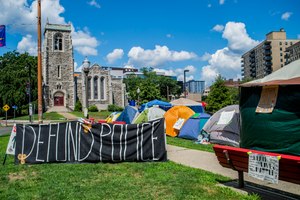
The position's $49,100 annual salary is fully funded for two years through a Community Development Block Grant
The Charleston Gazette-Mail
By Joe Severino
CHARLESTON, W. Va. — The Charleston City Council has voted to approve using federal grant money to create a mental health coordinator position.
The coordinator will be responsible for direct care services to people experiencing mental health crises and conduct outreach efforts in the city. The person also will work alongside the Charleston Police Department and provide training on mental health issues to officers.
The position, at a $49,100 annual salary, is fully funded for two years through a Community Development Block Grant. Council members debated the position for more than 20 minutes Monday. The vote was 24 in favor and two against the resolution.
Councilwoman Shannon Snodgrass said she was concerned about future funding for the position. Snodgrass and Councilman Adam Knauff were the two "no" votes against the resolution.
Mayor Amy Shuler Goodwin said the city will make clear to everyone who applies that the position is only guaranteed for two years. The post will serve as a pilot project for the city.
"If we can show that this has been a benefit to the citizens of Charleston and been extremely helpful to our police department, then we'll look for that money and do future securing," Goodwin said.
Charleston Police Chief Tyke Hunt said Tuesday he supports the decision to add the position. He said handling mental health and psychological emergencies on top of law enforcement and policing make the job even more difficult.
Police officers are often tasked with trying to wear too many hats," Hunt said. "The mental health professional is going to help us do our job better, because we can begin to identify some of those folks that need help that may not need the penitentiary ... they just need medical treatment."
The mental health coordinator will serve in a role comparable to the city's homeless outreach coordinator, Kevin Johnson. Hunt said the two positions will work jointly with the department to find treatment solutions for those who want help.
"All [the position] does is it gives us more tools to reach out and help folks, build relationships ... and find the best avenue to offer someone the help they need," Hunt said. "There are very few problems you can simply arrest your way out of."
Councilman Courtney Persinger said that, while supporting mental health programs is great, "my concern is that we're trying to treat the mental health of far more than our own community."
Persinger said his general contractor company, Persinger & Associates, recently was robbed but police were able to track down the suspects and arrest them. He pointed out that none of the suspects is from the area.
Goodwin said police officers are going to be facing situations where people are in a mental health crisis, regardless of where they are from. Councilman Bruce King echoed Goodwin's statement, saying criminals and people seeking help will be treated differently.
"Mental health and addiction go hand in hand. The people that are stealing, the criminals, they're more than likely not interested in getting the mental health [help] that they need," King said. "The people that want to get help will get help."
Councilman Joe Jenkins said the position supports the idea that the police department can now put more resources toward tracking real criminals and not on situations that require extensive mental health training.
"Unfortunately, the police in these types of situations is a sledgehammer when a scalpel is needed," Jenkins said.
Councilwoman Deanna McKinney supported the position and brought up Freda Gilmore's police brutality case, in which two Charleston officers kneed and punched Gilmore, a Black woman, in the head during an arrest in October 2019. The incident caused the city to reexamine the department's use-of-force policy, which remains ongoing.
Councilwoman Keeley Steele said people who live in an urban neighborhood understand police officers are often thrown into situations where a mental health professional is clearly needed, and that many of the nonprofit mental health services in Charleston have been overwhelmed.
Mental health crises aren't just happening in the city streets, Jenkins said. In neighborhoods across Charleston, urban or rural, people live with a mental illness.
(c)2020 The Charleston Gazette (Charleston, W.Va.)
McClatchy-Tribune News Service
Copyright © 2025 GovGrantsHelp.com. All rights reserved.
